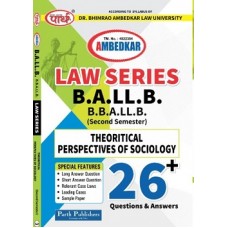- BA
- BA One Week Series(Rajasthan) HINDI Medium
- BA ONE WEEK SERIES (JNVU) HINDI MEDIUM
- BA ONE WEEK SERIES (JNVU) ENGLISH MEDIUM
- BA One Week Series(Rajasthan, Brij, Matsya, shekhawati) English Medium
- BA One Week Series(Shekhawati) HINDI Medium
- BA One Week Series(Shekhawati) English Medium
- BA ONE WEEK SERIES (UNIVERSITY OF KOTA) ENGLISH
- BA ONE WEEK SERIES (MDS) ENGLISH MEDIUM
- BA ONE WEEK SERIES (MGSU) ENGLISH MEDIUM
- BA UNSOLVED PAPER (RU)
- BA TEXT BOOKS
THEORETICAL PERSPECTIVES OF SOCIOLOGY (AMBEDKAR UNIVERSITY)
THEORETICAL PERSPECTIVES OF SOCIOLOGY (AMBEDKAR UNIVERSITY)
Rs. 100.00 Rs. 200.00
Inclusive Tax: Rs. 100.00
Inclusive Tax: Rs. 100.00
Product Details
PAPER 2.3. THEORETICAL PERSPECTIVES OF SOCIOLOGY
SCHEME OF PAPER: MAX. MARKS: 100 MIN. PASS MARKS: 36 This paper shall consist of following two parts: (a) Written paper — 70 marks (b) Internal examination — 30marks (15+10+5) Mid Semester Test: 15 marks Project/Assignment:10 marks Presentation: 05 marks The candidate must pass in part (a) and (b) separately. For passing, he shall be required to obtain 36 percent marks in each part, i.e. 25 marks out of 70 and 11 marks out of 30 marks. (1) The question paper shall be divided into two (02) Parts viz. Part – A and Part – B. (2) Part – A shall consist of five (05) compulsory questions of two (02) marks each whereas Part – B shall consist of seven (07) questions. The Candidate is required to attempt any four (04) questions. All questions carry equal marks. (3) The prescribed syllabus includes latest amendments in the subject wherever applicable.
OBJECTIVES OF THE COURSE: The course is aimed at introducing the students with the basic concepts and approaches used for explaining and understanding family, Marriage, Culture and Religion. The course also aims at introducing students about the process of socialization and the importance of Social Interaction. Students will also be acquainted to specific Contemporary Social problems in the Indian context. To make the students understand, analyse and evaluate the processes and importance of social interaction and socialisation in day to day life; understand and analyse social institutions like family, religion, marriage in the context of changes in these institutions; identify social problems and offer analysis on the core reasons the issue has developed and to identify how social problems and processes interact.
UNIT- I Introduction: Significance and Importance of Theory; Enlightenment - The social, economic and political forces; The French and Industrial Revolutions in the development of sociological thought; Indian Movements and their contribution for the development of sociology in India
UNIT-II Schools of Sociological Theory and Content of Theories–Basic Concepts: Significance of Theories and their relationship to Law; Schools of sociological theories - Functionalism, Conflict School, Social Action Perspective; Social Stratification: Meaning and Characteristics of Social Stratification, Caste and Class; Religion, family and state.
UNIT-III Sociology of Law; Relationship between Law and Society; Significant Indian Sociological Thinkers: Andre Beteille: Religion and Secularism - Caste - Class - Links between Poverty and inequality - Role of Institutions; M.N. Srinivas - Caste and Caste Systems - Social Stratification; Gail Omvedt; anti-caste movements; environmental movements; farmer‘s and women‘s movements;
UNIT-IV Social Welfare: Meaning, Scope and evolution of social welfare; Social Legislation; Contemporary Social Problems: Child Abuse, Elderly abuse, Problems of Youth (drug addiction, unemployment, suicide), Disabled, Working women and Transgender
UNIT-V Social Dominance Theory: Psychology of Dominance- Circulation of OppressionOppression and co-operation; Theoretical and practical issues of Psychological Dominance in Indian Context Social Problems: Meaning, Causes and Solution; Theoretical Perspectives: Functionalist, Conflict, Symbolic Inter-actionism;
Powered By PAWAN SHARMA
Online Book Mart © 2024






